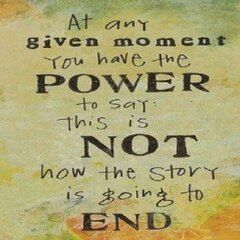

In 2010, U.S. adults spent nearly $61 billion dollars on the weight loss market. This includes everything from commercial weight loss chains (e.g., Jenny Craig, Weight Watchers) to meal replacement bars to prescription and over-the-counter weight loss pills to self-help books. With Americans spending close to Bill Gates’ net worth each year in their quest to lose weight, you’d think we’d all be as skinny as Kate Moss. Yet, nearly 70% of adult Americans are overweight or obese.
It’s not that the diets themselves don’t work, although some of them are clearly gimmicks. It’s that most of us have the mentality that diets should be quick fixes (they aren’t), and once the pounds come off they should miraculously stay off (they don’t). As a result, most people end up blaming themselves for their inability to lose weight and keep it off, spurring them to try yet another diet that won’t work.
Through 15 years of research on disordered eating and dieting, this is what I’ve come to realize: we need to stop dieting. Why? Because the diet mentality itself is a primary contributor to America’s obesity epidemic. Thanks to the Deprivation Effect, the What the Hell Effect, and the Rebound Effect (among others), we are physiologically and psychologically programmed to fail whenever we attempt to restrict calories.
Why? To quote Dr. Rick Kausman in If Not Dieting, Then What?, DIET should stand for: Deprivation, Impressive (initial weight loss), Energy sapping, Temporary. I completely agree. It’s time for those who struggle with weight to give up dieting for good.
So if you’re not supposed to diet, what are you supposed to be doing exactly? I offer 5 simple steps:
1) Understand why you eat what you eat—until you can understand why you crave a donut at 3:00pm every day, you will continue to struggle with your weight. You see, cravings are our body’s way of telling us that it needs something—but it’s probably not a donut. We’ll discuss how to understand your cravings more in future blogs.
2) Stop blaming yourself—there’s a reason that you’re struggling with your weight and it’s not lack of willpower. As a society, we tend to blame people for being less than perfect. Yet, none of us are. 9 times out of 10 we are our own worst critics. It’s time to stop. Stop berating yourself. Stop trying to live up to someone’s expectations. Stop beating yourself up for every perceived “failure.” We need to work on positive self-talk and ways to build your self-esteem. Stayed tuned for future blogs on that topic.
3) Ask yourself what you really need—for many of us food is a poor substitute for what we really want—love, forgiveness, a hug, to be heard. We train ourselves to reach for something—often food—to fill an emotional need. But that’s not the solution. (See my previous blogs for more on emotional eating.)
4) Learn how to manage your stress—you may have seen a commercial for a product called Cortislim a couple of years ago. The manufacturers designed their product based on the idea that the more stressed we are, the more likely we are to accumulate belly fat (which is true). They claimed CortiSlim would “block” cortisol production and make you lose weight. (They actually got sued for false advertising in 2007 and had to retract that claim.) But they did have a point. Stress can make you fat and prevent you from losing weight. We’ll talk more in the weeks to come about stress-management techniques that don’t involve eating. We’ll also discuss how lack of sleep can contribute to your stress level and difficulty losing weight.
5) Learn to listen to your body – when you were 2, your body did a really good job of regulating your food consumption. It knew just what it needed and when it needed it. But as we get older, we start to learn “rules” about food consumption and we forget how to listen to our bodies. In the coming weeks, I’ll give you tips for how to unlearn those rules so you can start to get back in touch with what your body really needs.
I hope this week’s post gave you some insight into reasons why you might be struggling with your weight. In the coming weeks, we’ll discuss weight loss, weight gain, and the best ways to make peace with food and your body.



